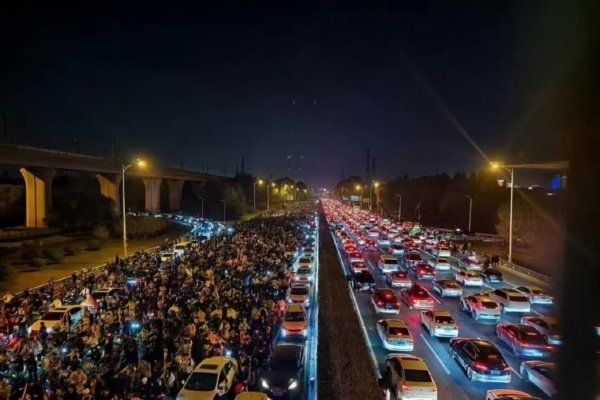Unprecedented excitement in Henan Zhengzhou and other areas as university students take part in the large-scale event “Night Ride to Kaifeng” using shared bicycles has touched the fragile and sensitive nerves of the Chinese Communist Party (CCP) authorities, who have ordered relevant units to take measures to cool down the activity. The viral song “Night Ride to Kaifeng” circulating on the internet is mocking the CCP.
Last weekend, the Henan provincial police began implementing traffic controls on certain sections of the Zhengkai Highway. Shared bicycle companies issued notices stating that their bicycles cannot be ridden across borders; otherwise, they will be automatically locked. Universities in Zhengzhou also issued announcements advising and restricting students from leaving campus at night.
The official overreaction, similar to the tactics used in the past for “zero tolerance,” prompted netizens to post on Weibo saying, “Let’s go back to before the pandemic,” banning riding, travel, and leaving campus.
A video accompanied by the song “Night Ride to Kaifeng” went viral on the internet, with lyrics full of mockery towards the CCP. In the video, students sing, “Oh, Party, dear mother, we haven’t spoken ill of you, nor do we dare to scold you; don’t panic or be afraid, we’re just going to Kaifeng to eat buns, chatting with classmates… Don’t panic or be afraid, the buns in Kaifeng are delicious and big-sized, after eating buns, we’ll return to campus.”
The event originated one night in June this year when four female university students in Zhengzhou suddenly wanted to eat “soup-filled buns.” Riding shared bicycles, they set off for Kaifeng and arrived at dawn, not only eating the buns but also sharing their experiences and sights during the ride on social media and the internet, resulting in overnight fame. This not only garnered praise and imitation from other Zhengzhou students but also led to the event’s escalating scale and impact.
After entering November, “Night Ride to Kaifeng” has become a fashion sweeping across China, with large-scale “night rides” by university students and young people appearing in various Chinese cities. In Beijing, there was an event “Night Ride to Tiananmen Square,” where after students on bikes were obstructed by police at Tiananmen, they rode to Tianjin. In Nanjing, many students cycled to Chaohu in Anhui, and even further to Ma’anshan. Students in Chengdu went to Dujiangyan. The target for students in Wuhan was the Donghu Lingbo Gate. Students in Xi’an night rode to Xianyang.
Meanwhile, on the Zhengkai Highway, there are often tens of thousands or even hundreds of thousands of people in the “night riding army.”
Some netizens have referred to this wave of university students’ night rides as a “new wave of student unity,” even suggesting it is an attempt to explore “freedom of association” spontaneously.
Photos and videos circulating on the Chinese internet showed that on November 8, the crowds and bicycle flow on Zhengkai Highway were unbearable, with many sections completely impassable. However, young people, under slogans like “Youth is priceless, enjoy the moment, live in the present,” showed undiminished enthusiasm.
According to a report by Reuters, the rapid rise and spread of the “night riding army” are directly related to the ubiquity, accessibility, and extremely low cost of shared bicycles in China. The rent for a shared bicycle is as low as 15 RMB per month. Photos posted by riders online showed that on the 9th, the entire city of Kaifeng was filled with shared bicycles.
The highly sensitive and nervous CCP authorities are always on high alert when it comes to large-scale group activities. Starting from the 9th, authorities in Henan issued an emergency order, requiring several high schools to enforce campus closure management and not allow students to leave.
Early on the 9th, “Kaifeng Rongmei” consecutively issued appeals, hoping that young people would be “passionate but stay safe.”
In the afternoon of the same day, the police in Zhengzhou and Kaifeng respectively issued notices, implementing temporary bans on the non-motor vehicle lanes on the Zhengzhou and Kaifeng sections of Zhengkai Avenue. The notice from Kaifeng Public Security Bureau Traffic Police Detachment stated that from 4 p.m. on November 9th to 12 p.m. on the 10th, a prohibition measure would be enforced on the non-motor vehicle lane of the Zhengkai Avenue in Kaifeng.
Hello Bike, Qingju, and Meituan, the three major bicycle platforms, also jointly released a notice emphasizing that shared bicycles must not be ridden across zones; otherwise, they will be forcibly locked, and a dispatch fee will be charged to the rider.
The CCP’s cooling measures have paradoxically led to the event growing even bigger and becoming a nationwide trend. According to Radio Free Asia, students in Wuhan, Nanjing, Hefei, Chengdu, and other cities have also initiated night rides, with six Tianjin university students riding 109 kilometers straight to Tiananmen Square in Beijing.
Some say that because current university graduates lack prospects and face the terror of graduating into unemployment, with youth unemployment rates remaining high, universities foresee a bleak future. Thus, they use this method as a form of release. One post expressed, “Having spent ten years studying but finding no job, educational credentials in hand but no path forward. I wonder where to go, asking Judge Bao with ten thousand riders.”
Some comments point out that when young people ride together, the authorities see them as a “gathered riot,” and authorities become afraid as more people join.
Some have reposted comments on platform X, saying, “The night ride in Zhengzhou is this country going through closure, all kinds of social violence, then vigorously denying the facts, denying political issues, denying social spiritual issues, and treating themselves as a severely amnesic patient.”

